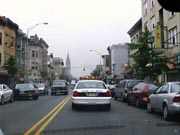In statistics released June 1 by City Hall, crime as a whole has continued to drop, but noticeable surges have occurred in violent crimes.
Murder, rape, aggravated assault, robbery and arson increased by 9 percent from January through March of this year compared to the same time last year. However, lesser assaults have dropped by 17 percent, burglary by 17 percent, larceny by 9 percent and auto theft by 5 percent.
According to Police Department Chief Frank Gajewski, the statistics are accurate and they show a dramatic drop overall in crime, the lowest it’s been since the early 1970s.
“If you look at the statistics as a whole, we had a good year,” Gajewski said during a phone interview. “More officers are out on the streets.”
Over the last decade, a series of community policing programs and other task forces have spurred on the trend to lower crime in Jersey City, Gajewski said.
The increase in violent crimes did not go unnoticed. During meetings with the four precinct commanders, the issues of violent crimes were discussed to find ways to improve the police’s approach to the situation, the chief said.
One area that concerns the police is the city’s illegal drug market. One way to handle the problem has been to place officers in strategic areas in the neighborhoods to make it more difficult for dealers to distribute illicit narcotics, Gajewski said.
“We have teams of cops to stop dealers. We have disrupted their system,” the chief said.
The new approach for the city’s police department is crime prevention, according to Police Director Michael Moriarty.
His philosophy is to have more police officers on the streets for the purpose of deterrence. “That is the most difficult thing to tell an officer,” Moriarty said. “They are trained to make arrests and now you tell them to focus on prevention.”
Perception of the city’s crime may vary from person to person. In certain neighborhoods, crime is still high, Moriarty admits, but the overall picture looks good, so far.
“That would frustrate me if I hear crime is going down and I see [drug] dealers selling on the corner,” Moriarty said.
According to Gajewski, Jersey City, the second largest city in the state, compares well to other large New Jersey cities.
“We are one of the lowest cities in auto theft,” the chief said.
Both Gajewski and Moriarty hope to see continued drops in crime in the near future. To achieve that goal, Gajewski said, residents have to be more involved in anti-crime programs in their community.
“We have changed our philosophy, and that has affected crime,” Gajewski said.
Gajewski added that during his campaign, Mayor-Elect Glenn Cunningham, a former U.S. Marshall, vowed to reduce the city’s crime. The chief said he hopes the new mayor follows through on his word.
Police apprehend suspect in murder of activist
A man has been arrested and charged with the murder of a Jersey City resident known throughout the neighborhood as a community activist.
Milton Bland, 44, of Jersey City was arrested on Monday for allegedly killing Wesley Hall, 39, on June 6, according to Hudson County First Assistant Prosecutor Terrence Hull.
Hull said that investigators suspect Bland murdered Hall because he thought Hall was having a relationship with Bland’s his wife. Hull said that Bland had been separated from his wife the last three months.
Bail for Bland has been set at $1 million, and he is currently under custody at Hudson County Jail in Kearny. Bland waits for a court hearing, slated to come in the following weeks as the prosecutor’s investigation concludes, Hull said.
The victim was shot three times in his apartment while he was on the phone with a friend. An autopsy report showed that Hall was hit on the chin, forehead and ear. No murder weapon has been found.
At first, police believed that Hall had been murdered because of his anti-drug activities in his community. There was an outpouring of support for the victim. Police suspected that seven vials of cocaine scattered on the floor of Hall’s home were planted by the killer to discredit the victim. Now, Hull said, investigators think that the suspect did plant the drugs, but that it was done to make it seem as though the murder was retaliation from drug dealers.
